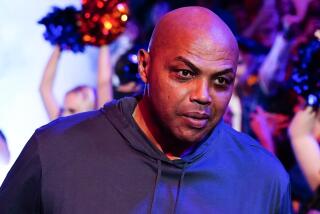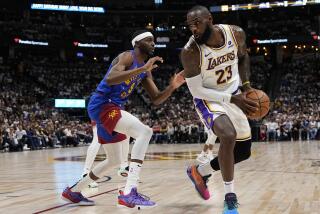Nobody Loses in This ‘Let’s Make a Deal’
- Share via
DENVER — Using the NHL experience as a “cautionary tale,” as Commissioner David Stern put it, the NBA is trying to head off its own labor problems ...
Oh, the NHL’s back?
Oh, it’s not?
Oh, whatever. As this weekend’s high jinks suggested, what hockey really had was a massive failure of leadership on both sides.
Of course, if the NBA misses so much as a day of training camp next season, it will signal a failure on the part of Stern and union head Billy Hunter that would make the NHL’s bumbling look like a doctoral dissertation.
The NBA might have some problems, like the occasional altercation in which the players beat up the customers, but its economic system isn’t one of them.
“God help us if we can’t make a deal,” a management source said last week, “because this system works pretty well for both sides.”
It is widely believed that NHL owners need relief, even if the commissioner, Gary Bettman, couldn’t convince his union counterpart, Bob Goodenow, or Goodenow didn’t want to know. However, in the NBA, labor and management agree that the current system works.
Stern says he wants to “tweak” it, meaning cut the maximum length of contracts from seven seasons to four.
For their part, the players aren’t asking for a single thing and are willing to shorten contracts to six years.
That suggests there’s a deal to be made at five. Boy, that was easy. Next case.
Suggesting a new time had indeed arrived, Stern and Hunter did everything Saturday but fall into each others’ arms and declare their everlasting love.
Hunter dropped his recent tough talk that the owners were going for a “hard cap,” which he said was “repugnant” to the players.
“It still might be just as repugnant as it was before,” Hunter said Saturday, “but it may not be so repugnant that we can’t reach a deal.”
Stern revived “Easy Dave,” the old peaceable commish whose league had always enjoyed harmonious labor relations and just wanted to get along.
“It may be combining sort of reality with hope, but I think there will be a deal by the end of the season,” Easy Dave said.
The NBA owners faced their own NHL-like situation in 1998, when Hunter was new, the owners were losing money and insisting on major givebacks, the players were spoiling for a fight and hawklike super-agent David Falk packed the union’s executive committee with clients who followed his dictates like automatons.
“Easy Dave” turned into “Hard Dave,” locked the players out until January 1999, promised he was ready to shut it down and almost lived up to his word before a last-minute gimmick bridged the gap between the two sides.
That was an escrow tax, which withheld 10% of salaries in case the owners’ defined share of revenue came in light.
If that wasn’t enough, a luxury tax on the fattest payrolls would kick in. Sure enough, the owners’ share came in light, around 35% to 38%, as opposed to the 43% to 49% they were supposed to get, but the escrow and luxury taxes brought them up to where they were supposed to be. The luxury tax isn’t even
expected to be needed this season.
At the time, it was a compromise nobody liked. The owners thought they hadn’t gotten the cost certainty they needed. Hunter was derided for letting Stern run him over.
“A lot of it was generated by Marvin Miller [the retired head of the baseball players union], who said we had sold out the players,” Hunter says.
“And now, it’s so ironic, when you look what’s happened in ice hockey, coupled with the actual impact of what our deal was. Our ballplayers went from earning about $950 million six years ago and they’re earning $1.9 billion this year.”
NBA players now have four of the 10 biggest salaries in sports, more than baseball or any other league.
The average NBA player is the highest-salaried athlete at around $3.5 million. The league has the highest minimums so a journeyman such as Matt Barnes, who had played 38 NBA games, had to get at least $695,000 when he made the Sacramento Kings.
Meanwhile, the owners did get their cost certainty. The percentage of revenue going to salaries reversed its direction and began dropping and the industry began to turn profitable.
At the 2002 All-Star game in Atlanta, Stern and Hunter announced they would try to reach an early agreement on a new deal, because they didn’t think the public would stand for tales of woe from the rich and famous in the wake of 9/11.
This signaled tacit agreement that the system they had was OK. Then the 9/11 shockwaves subsided and everyone went back to their respective corners. Little progress was reported for two years, until the NHL crashed and burned, or whatever it’s doing, last week.
Until then, the general belief was that the NBA would get a deal but it might not be before Stern locked the players out July 1 and everyone called each other names all summer.
In the NBA, this has happened so often, they have a name for it: soft lockout.
“That’s where all you really miss is summer league,” a team official said last week. “The coaches are secretly happy and nobody misses a paycheck.”
However, for your professional athlete or league executive, there’s nothing like staring into the abyss to restore your perspective, even if it’s someone else’s abyss.
You mean, we have to go out and get jobs?
Stern says the NHL debacle comes up only every time the two sides sit down.
“It’s the opening prayer of every meeting,” Stern said. “I mean, I don’t know what else to say. We talk about it. ‘What do you hear? What’s new? What do you think?’
“And it sort of drives us to say, OK, we may not be talking with everyone in this room about how we feel about every position, and we don’t intend to, but we have a pretty good idea where the other guy stands. And the question is, what trades can we make to narrow the gap?
“So we are pretty well revealed to each other.... I think that’s really what, in a way, didn’t happen in hockey, without characterizing one side or the other.”
Of course, they don’t actually have a deal done yet, but everyone is happy. In this league, it doesn’t get any better than that.
Faces and Figures
Zo and Shaq, together, at last: East teams let Alonzo Mourning clear waivers and he’s expected to sign with the Miami Heat, because claiming him would have meant picking up the last 2 1/2 seasons and $13 million of his contract.... Thus, the Heat gets the game’s best backup center and Shaquille O’Neal now finds himself on the same side as his former archenemy. “It’s never anything personal with me off the court,” O’Neal says. “I always tell the story of David Robinson. If I see him in a restaurant with his family, I’m not going to walk over to his table and accidentally bump a Diet Coke in his lap because I hated him on the court. Off the court, it’s ‘Hi, Mr. Robinson, hello, little David; hello, Mrs. Robinson.’ But on the court, I’m trying to break his jaw.”
Just isn’t his year: First Steve Francis was traded to Orlando. Then Orlando sent away his running mate Cuttino Mobley. Now, Francis, who was going to introduce his new “Steve-O” line of gear here this weekend, has had to postpone the launch, on account of not making the East squad. “Since I’m not going,” he said, “I’ll just wait awhile.”
Oops: Left for dead after their 3-12 start, the New Jersey Nets are climbing with Vince Carter averaging 25.7 for them (vs. 15.9 in Toronto.) If they had Richard Jefferson, who’s out after wrist surgery, they would be the class of the bedraggled Atlantic Division and they’re still within range of the first-place Boston Celtics. “We can be very dangerous in the playoffs and that is also including me,” Jefferson said. “I’ll be back. My cast comes off around March 20, maybe a little before that. Give me a month or so of rehab. I won’t be at 100%, but I will definitely be capable of helping the team.”
More to Read
Go beyond the scoreboard
Get the latest on L.A.'s teams in the daily Sports Report newsletter.
You may occasionally receive promotional content from the Los Angeles Times.










